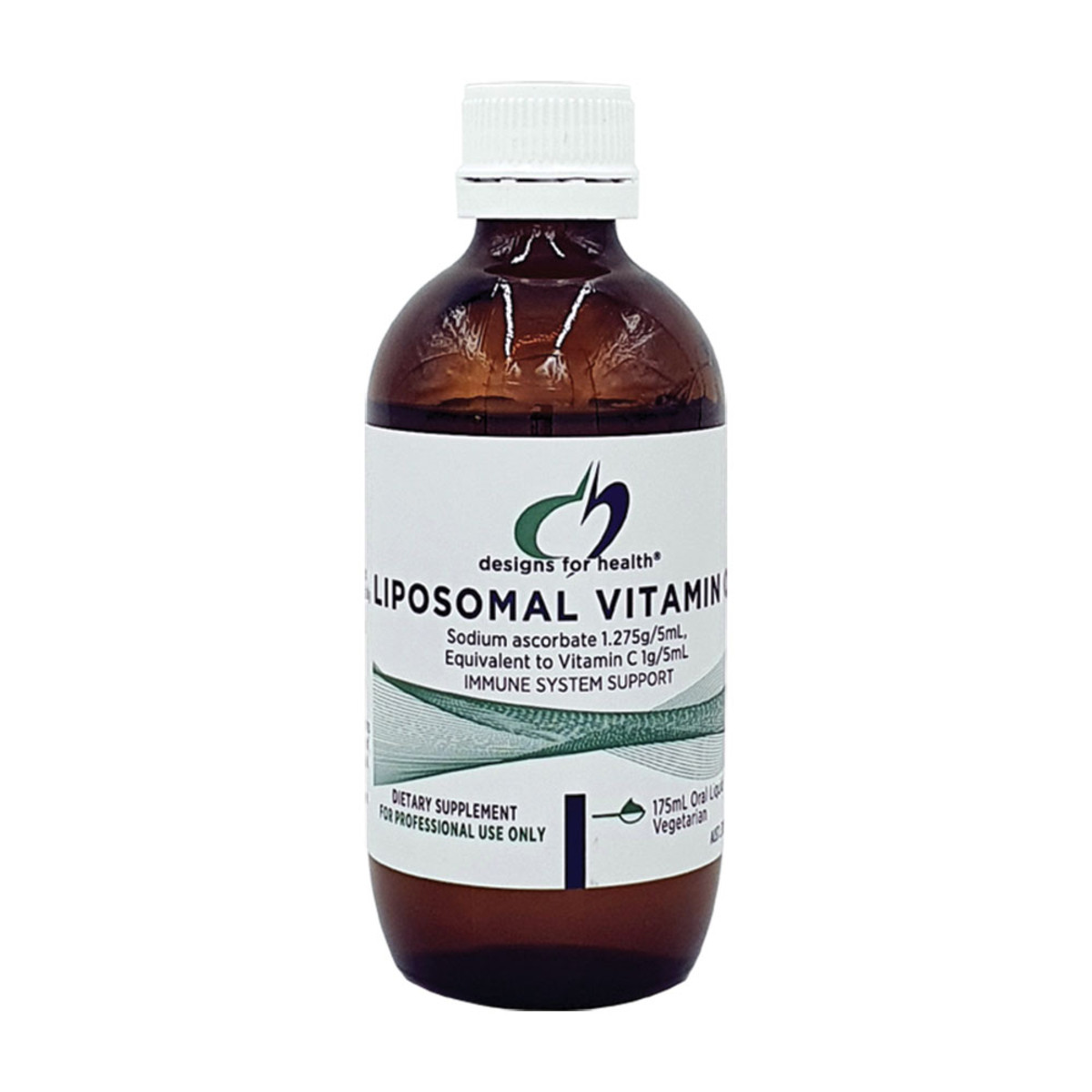Liposomal Vitamin C™ 120ml – Designs for Health Lypo
High potency Lypo-Spheric vitamin C using liposomal technology for superior absorption and delivery .
Description
Designs for Health set out to find a new delivery method, so that when nutrients travel through the digestive system they are more readily absorbed into the blood and have increase opportunity to reach the cells with full potency. This effective strategy is called liposomal technology.
Liposomes are spheres made of phospholipids, which are the basic building blocks of cell membranes, and they’re produced in liquid form. They encapsulate nutrients and bond with cell membranes to facilitate their delivery. Since liposomes bond so easily with the cell membranes, nutrients are more easily absorbed. That means lower doses may have equal or greater efficacy than higher doses provided in forms that are less bioavailable. Additionally, liposomes are extremely tiny particles, which allow for fast absorption in the body, starting in the mouth, where they’re absorbed through the inner lining of the cheeks and the floor of the mouth.
As Designs for Health was one of the first companies to develop liposomal technology, we knew that we had our work cut out for us, as the liposome particle size would have to be as small as possible in order to achieve the highest absorption rate. Ultimately, we created the smallest liposome particle size in the industry — from 50 to 100 millimeters, as opposed to the more common 200 to 600 millimeters from other manufacturers. These smaller particles are developed to go straight into the bloodstream and cells, resulting in faster absorption in the mouth, plus the smaller particles circulate throughout the body longer.
The phospholipids used in DFH’s new liposomal products are derived from non-GMO sunflower lecithin instead of soy lecithin, also allows for effective delivery with both water and fat soluble compounds. Liposomes also penetrate the blood-brain barrier, and though they absorb quickly in the mouth, they also survive the acidic environment of the stomach, ensuring intestinal uptake and delivery to their target tissues.
With an absorption rate of up to 98% compare to industrial standard of 90%, this new nutrient delivery system is ground breaking. The potency of nutrients delivered by liposomes also means this advanced technology is beneficial to those who would prefer to swallow fewer capsules.
OVERVIEW
Designs for Health’s Liposomal Vitamin CTM provides this key foundational nutrient formulated with liposomal technology for optimal absorption and bioavailability. Each 5 mL serving (approximately 1 teaspoon) of this lemon flavoured formula provides 1000 mg vitamin C, as sodium ascorbate. The 130 mg sodium per serving facilitates absorption of vitamin C via sodium-dependent transporters. KEY FEATURES: Immune system support immediately comes to mind when we think of vitamin C, but this nutrient has a host of roles in various tissues and systems beyond bolstering immune defences. As a cofactor for enzymes involved in the synthesis of serotonin and norepinephrine, adequate vitamin C levels may help individuals maintain a positive mental outlook and mount a healthy response to everyday stress. Its function in catecholamine synthesis may be why vitamin C has long been recognised as helping to support the adrenal glands. In fact, the adrenal glands contain one of the highest concentrations of vitamin C in the body (in both the cortex and medulla), underscoring that this nutrient is instrumental for far more than antioxidant effects.1 Vitamin C is required for function of the enzymes that transform the amino acids proline and lysine into hydroxyproline and hydroxylysine, key components for synthesis of collagen — including that which constitutes blood vessels — which underlies, in part, the crucial role of vitamin C in cardiovascular health, and explains why easy bruising and bleeding are signs of vitamin C deficiency. Vitamin C has long been considered as a requirement for biosynthesis of carnitine (from the amino acid lysine), which is needed for enzymatic transport of fatty acids into the mitochondria for subsequent oxidation and generation of ATP.2,3 This has been called into question,4 but nevertheless, while a multitude of factors affect metabolism and body weight, marginal vitamin C status may impair fat oxidation during submaximal exercise, and optimising vitamin C levels may facilitate fat loss.5,8 Finally, vitamin C’s antioxidant function is a hallmark of this nutrient. Vitamin C is a potent neutraliser of free radicals and helps to recycle vitamin E and glutathione. Increased levels of oxidative stress are associated with a wide array of chronic health issues. They are both a potential contributor to, and a downstream effect of conditions including but not limited to type-2 diabetes,7 Alzheimer’s disease,8 other neurodegenerative disorders,9 and frailty in aging individuals.
Liposomal Technology Many nutritionists argue the body’s need for vitamin C far surpasses the paltry RDA recommendations. Dr. Linus Pauling, who pioneered extensive research on vitamin C, believed optimal amounts exceed 2,000 mg daily, with even higher amounts potentially exerting a therapeutic effect in acute situations. Certain circumstances may necessitate a high dose of vitamin C, but high doses administered orally often lead to diarrhoea and other forms of GI discomfort, thus limiting the dose that can be given at one time. Intravenous vitamin C is an effective alternative, but this option may be logistically inconvenient and financially impractical for some individuals. Liposomal Vitamin C is an excellent solution to all of these obstacles. Liposomal delivery provides a well-tolerated, easily absorbed and highly bioavailable form of vitamin C without the unpleasant side-effects of high oral doses. Liposomal Vitamin C also offsets the decrease in absorption known to occur with increasing oral doses. In addition to enhanced absorption, nutrients delivered via liposomes enter the lymphatic circulation first, bypassing first-pass metabolism in the liver, thus increasing bioavailability.12 Because this product provides vitamin C as sodium ascorbate, individuals with gastrointestinal sensitivity may tolerate this buffered form better than regular ascorbic acid. What are liposomes? Liposomes are spheres made of phospholipids — the primary building blocks of cell membranes. Owing to this structure, liposomes bond easily with cell membranes to facilitate intracellular delivery of their nutrient cargo. Thanks to this enhanced delivery and absorption, nutrients delivered in liposomal form at lower doses may have equal or greater efficacy than higher doses provided in forms that are less bioavailable. Designs for Health’s Liposomal Vitamin C employs liposome particles that are 50-100 nm in size, in contrast to 200-600 nm particles that are more commonly available from other manufacturers. The smaller sized particles result in increased oral and cellular uptake and faster transmucosal absorption in the mouth. In fact, it is recommended to hold the product in the mouth for 30 seconds before swallowing to take advantage of this effective route of absorption. Additionally, clearance of these particles from the bloodstream (via the liver and spleen) is inversely related to size: the smallest particles circulate the longest, increasing the likelihood of absorption at their target tissues. Note that the phospholipids used in this product are derived from sunflower lecithin (soy-free, non-GMO material). Benefits of Liposomal Delivery > Superior absorption and intracellular delivery of nutrients. > Phospholipid structure allows for effective delivery of compounds with different solubilities carried within the same particle (e.g., water and lipid-soluble compounds). > Liposomes penetrate the blood-brain barrier, an obstacle for other various formulations. > While there is an opportunity for quick absorption in the mouth, liposomes also survive the acidic environment of the stomach, ensuring intestinal uptake and delivery to the lymphatic system. > Liquid liposomal formulations are convenient for those who prefer to swallow fewer pills; also allow for easy dosing.
Liposomal Vitamin C provides this indispensable nutrient formulated with liposomal technology for optimal absorption and bioavailability. Each 5 mL serving (approximately 1 teaspoon) of this lemon flavored formula provides 1000 mg vitamin C, as sodium ascorbate, along with 130 mg sodium (as Sodium Ascorbate), which helps facilitate the
absorption of vitamin C. Immune system support immediately comes to mind when we think of vitamin C, but this nutrient has a host of roles in various tissues and systems beyond bolstering immune defenses. Vitamin C is a cofactor for enzymes involved in the synthesis of serotonin and norepinephrine.
As such, adequate vitamin C levels may help individuals maintain a positive mental outlook and mount a healthy response to normal, everyday stress. It is also required for the synthesis
of some of the hormones generated by the adrenal glands, and may be why vitamin C has long been recognized as helping to support adrenal function. In fact, the adrenal glands contain one of the highest concentrations of vitamin C in the body, underscoring that this nutrient is needed for far more than antioxidant effects.*
Vitamin C is required for healthy collagen synthesis. Collagen is a primary structural protein in connective tissues, such as bones, tendons and ligaments, as well as in hair, skin and nails. Blood vessels are also made largely of collagen, which accounts for the crucial role of vitamin C in cardiovascular health, and explains why occasional easy bruising and bleeding are signs that vitamin C levels may be less than optimal—think back to your high school biology textbook referring to bleeding gums as a classic sign of scurvy.*
Finally, vitamin C’s antioxidant function is a hallmark of this nutrient. Vitamin C is a potent neutralizer of free radicals and helps to recycle other antioxidants, including vitamin E and glutathione. It is important to make sure the body has sufficient antioxidant nutrients in order to mount a proper defense against our everyday encounters with free radicals.
What are Liposomes?
Liposomes are spheres made of phospholipids—the same primary building blocks of cell membranes. Owing to this structure, liposomes bond easily with cell membranes to deliver their nutrient cargo (in this case, vitamin C). Liposomes are extremely tiny particles, which allows for fast absorption in the body, starting in the mouth. Why Liposomal Vitamin C?
At certain doses, vitamin C administered orally can sometimes lead to diarrhea and other forms of GI discomfort. Intravenous vitamin C is an effective alternative, but this option is inconvenient and impractical for some individuals. Liposomal Vitamin C is an excellent solution to these obstacles. Liposomal delivery provides a well-tolerated, easily absorbed and highly bioavailable form of vitamin C without any unpleasant side-effects.
How to Take:
• As a dietary supplement, take 5 mL (approx. 1 teaspoon), or as directed by your health care practitioner.
• Since the very small size of the liposome particles allows for some absorption to take place right away, it is
recommended to hold the product in the mouth for 30 seconds before swallowing.
• Best taken on an empty stomach or at least 10 minutes before meals.
> Do not exceed a daily intake of 200 mg of vitamin C in patients with haemochromatosis.
> High doses of vitamin C may reduce the response to warfarin. Caution and monitoring is advised.
> Medications that may lower vitamin C levels include Asprin and Corticosteroids.
> Be aware of the tolerable upper limit (UL) for vitamin C is 2000 mg per day for pregnant and breastfeeding
women over 19 years and 1800 mg for those pregnant women aged 14-18 years.








